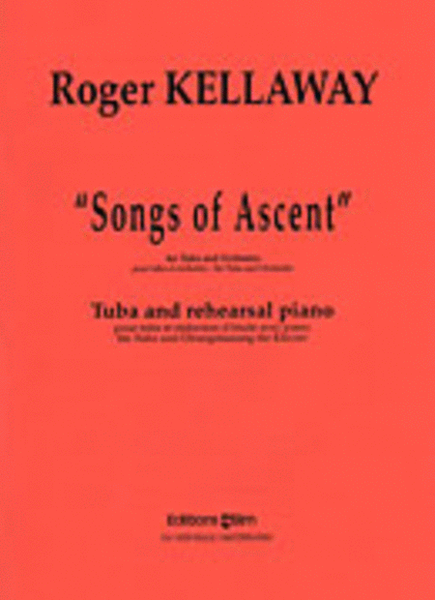Songs of Ascent
-
Ships in 3 to 4 weeks
Details
Description
SKU: ET.TU12A
Composed by Roger Kellaway. Contemporary. Piano (reduction). Composed 1988/89. Duration 26'. Editions BIM #TU12A. Published by Editions BIM (ET.TU12A).ISBN 9790207008688.
Commissioned by the Philharmonic Symphony Society of New York, Inc.
World Premiere:
24 November 1989, Avery Fisher Hall, Lincoln Center for the Performing Arts, New York, N.Y.
The New York Philharmonic, Zubin Mehta, Conductor, Warren Deck, Tuba
From a smile, to hysterical laughter is the consistent reaction whenever I mention the tuba. There is no other instrument of the modern orchestra that produces so much instant joy, upon hearing its name.
"Songs of Ascent" is a musical journey, demonstrating the tuba's wide range of melodic and technical skills; and, at the same time, it is a statement of the tuba's desire to be perceived from a broader perspective.
"Songs of Ascent", combining "classical" and "jazz" techniques, and commissioned by the Philharmonic-Symphony Society of New York, is written for Warren Deck (principal tuba, New York Philharmonic), and inspired by the encouragement of three other masters of the tuba: Harvey Phillips, Roger Bobo (Los Angeles Philharmonic), and Shemuel Hershko (Israel Philharmonic).
Conceptually, "Songs of Ascent" comes closest to the classical "Theme and Variations". However, in this case, the "Theme" is represented by an "Introduction", presenting specific elements of melody, harmony, rhythm and colour - a "song-to-be".
The "Variations" then, become developments of this material. Morever, each variation is first designed by harmonic progression (similar to the Baroque "figured bass") , tempo and rhythmic cycle. The music above, then, is composed like an improvisation - drawing on material from the "Introduction", and the "mood" generated by each tempo, harmonic progression, and rhythmic cycle.
Therefore, "Songs of Ascent" is revealed as an introduction, with nine improvisations.

 Share
Share